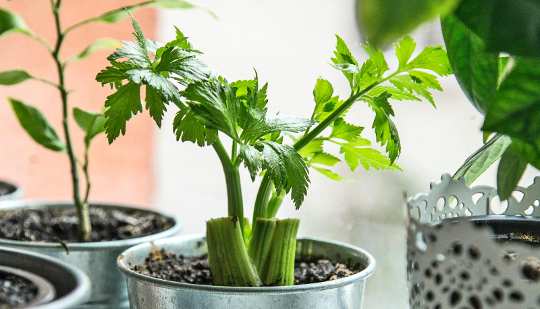
(Credit: Milada Vigerova/Unsplash)
Some of the fruits and vegetables you buy have seeds in them. Can you plant those? It depends.
There’s been a dramatic surge in interest in gardening during the COVID-19 pandemic—and that’s made it hard for home gardeners to get seeds.
First, remember that some of the vegetables you eat (like zucchini and cucumber) are harvested before they’re fully mature, because that is when they are most tender and delicious. Unfortunately, it also means the seeds inside are not likely to result in a viable plant.
Get The Latest By Email
And fruits and vegetables that do have mature seeds inside, like tomatoes and cantaloupes, pose another challenge: Many of those fruits and vegetables are hybrids.
Hybrid fruits and vegetables are developed using conventional pollination (they’re not genetically modified), meaning that plant breeders and seed producers are crossing two parent plants, male and female. As the seeds develop inside, the fruit or vegetable is produced on the mother-plant. These mother-plants have the desirable characteristics we hope to see in the marketplace, such as sweetness, fruit color, and size. However, the seeds inside are a cross between the two parent plants. That means when you save those seeds and plant them, you get a new plant that has characteristics of both of those parent plants.
Sometimes that can be a great new plant with novel new characteristics. But sometimes it can be a plant with less desirable traits, such as small fruit size. Since most vegetable varieties now are hybrids, that means the seeds inside are not necessarily going to produce fruits or vegetables like the ones you bought at the store.
However, there are a lot of people who do save seeds and even make their own cross pollinations in their home gardens. These folks are using open pollinated varieties and heirloom varieties. These varieties are the result of multiple crossings and while they are also not going to be identical to the fruit or veggie you bought, they would be similar and will be closer to their parent’s type than the seeds inside the hybrid varieties. There are even seed exchange sites, where you can trade seeds with other people interested in this hobby.
If you decide to plant some of those seeds from your grocery store veggies, you should check out the beginner’s guide to vegetable gardening from NC State Extension. In fact, Extension has a bunch of resources for even experienced vegetable gardeners.
However, if you don’t want to gamble on what your seeds might grow into, it’s worth noting that for some plants, you might not need seeds at all.
There are some veggies that you can “regrow.” It sounds a little bit like magic (and it is somewhat magical), but essentially you are resprouting these plants. For example, the butt end of a lettuce head can be planted shallowly and resprouted—meaning it will grow new leaves. The same can be done with celery, potatoes, sweet potatoes, ginger, fennel, and lemongrass. Since you are regrowing these from a piece of the original vegetable, you know what the resulting vegetable will taste like (as opposed to the uncertainty that comes with growing plants from hybrid seeds).
You can plant bean sprouts and they will grow into bean plants. You can plant cloves of garlic or onion hearts and they will reroot and grow. You can do stem cuttings from plants like basil and cilantro and they will root at the nodes and grow. You can also do the tops of turnips, but I’m not sure how many people eat turnips.
Lots of people sprout avocado seeds for fun. You can do this kitchen experiment with toothpicks and a jar of water and you’ll see roots come out. The avocado plant can be grown, but it’s a tropical tree, so you have to protect them if the temperature drops below 30 degrees Fahrenheit. Speaking of tropical plants, you can also plant a pineapple top—and if you are lucky a new pineapple will grow for you. But again, these are tropical, so it would have to be protected during the winter.
There are a variety of strategies for asexual propagation including cuttings and other methods (such as separation and division). You can learn more about all of these methods by checking out the “Asexual Propagation” sections in the NC State Extension Gardener’s Handbook.
So, if you are really hoping to start a garden, don’t let the lack of seeds stop you.
Source: Chris Gunter for NC State
books_gardening







